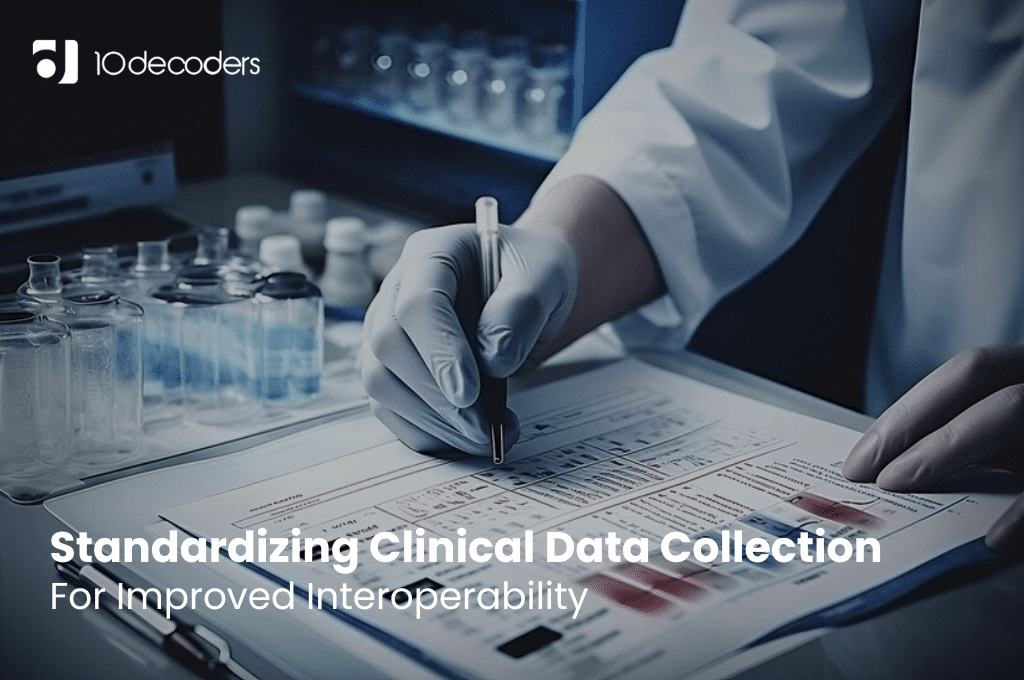Standardizing Clinical Data Collection for Improved Interoperability
In the ever-evolving landscape of healthcare, the standardization of clinical data collection stands as a crucial element for advancing patient care and medical research. Uniform data collection methods ensure interoperability, allowing for seamless data exchange across various healthcare systems and platforms. This blog explores the importance of standardizing clinical data collection, its benefits, challenges, and the steps needed to achieve it.
The Imperative of Standardized Clinical Data
Standardized clinical data collection refers to the uniform gathering and recording of patient information and clinical findings. This standardization is vital for several reasons
- Enhanced Interoperability: Standardized data allows for easier data sharing between different healthcare providers and systems, improving patient care continuity.
- Improved Quality of Care: Consistent data enables healthcare professionals to make informed decisions, reducing errors and enhancing patient outcomes.
- Facilitated Medical Research: Researchers can more readily aggregate and analyze standardized data, leading to more accurate and efficient medical advancements.
Current Challenges in Clinical Data Collection
Despite its importance, standardizing clinical data collection faces several challenges
- Diverse Data Formats: Healthcare data is collected in various formats, from structured electronic health records (EHRs) to unstructured clinical notes.
- Lack of Universal Standards: There is a lack of consensus on specific data collection standards across different healthcare systems and regions.
- Technological Barriers: Older or disparate IT systems can hinder the implementation of standardized data collection methods.
Strategies for Standardization
Adoption of Common Data Standards
Implementing widely accepted standards like HL7, FHIR, and LOINC can help in creating a uniform framework for data collection and exchange.
Training and Education
Educating healthcare professionals about the importance of standardized data collection and training them on how to implement it effectively is crucial.
Upgrading IT Infrastructure
Investing in modern IT infrastructure that supports standardized data collection and interoperability is essential.
Benefits of Standardized Clinical Data Collection
Improved Patient Outcomes: Standardization aids in providing accurate, timely, and comprehensive patient information, leading to better patient care.
Enhanced Data Analysis and Research: Uniform data collection facilitates more robust data analysis, contributing to more effective medical research and public health initiatives.
Increased Efficiency and Cost-Effectiveness: Standardized data reduces the time and resources spent on data conversion and interpretation, leading to increased operational efficiency.
Real-World Examples
Highlighting real-world examples where standardized clinical data collection has made a significant impact can be illustrative. For instance, the use of a standardized electronic health record system in a hospital network can demonstrate improvements in patient care coordination and reductions in medical errors.
The Role of Technology in Standardization
Advancements in technology play a pivotal role in standardizing clinical data collection. AI and machine learning can aid in converting unstructured data into standardized formats. Cloud-based systems facilitate easier data sharing and interoperability among different healthcare entities.
Integrating Patient-Centered Data Collection
A critical aspect of standardizing clinical data collection involves integrating patient-centered approaches. This means not only collecting data in a standardized format but also ensuring it accurately reflects patient experiences and outcomes. Incorporating patient-reported outcomes and experiences in clinical data enhances the depth and relevance of the information collected. This approach fosters a more holistic understanding of patient health, beyond just clinical indicators, contributing to more personalized and effective healthcare. Engaging patients in the data collection process also promotes greater patient involvement in their care, leading to improved patient satisfaction and adherence to treatment plans.
The Role of Regulatory Bodies and Policies
Regulatory bodies and healthcare policies play a pivotal role in standardizing clinical data collection. These entities can set guidelines and mandates that drive the adoption of standardized practices across the healthcare sector. For instance, regulations can stipulate the use of certain data standards or require the implementation of interoperable electronic health record systems. Policies focusing on data quality, security, and patient privacy are also essential in this context. By providing a regulatory framework, these bodies can facilitate a coordinated approach to data standardization, ensuring that all stakeholders in the healthcare ecosystem adhere to consistent and effective data collection practices.
Looking Towards a Data-Driven Future in Healthcare
As we move towards a more data-driven future in healthcare, the importance of standardized clinical data collection becomes increasingly apparent. The potential of big data and analytics in transforming healthcare is immense, but it hinges on the availability of high-quality, standardized data. Harnessing the power of this data can lead to groundbreaking advancements in personalized medicine, predictive analytics, and public health strategies. The journey towards standardization is complex and requires the concerted effort of various stakeholders. However, the benefits – improved patient care, enhanced research capabilities, and overall system efficiency – make this endeavor not just worthwhile, but essential. As technology continues to evolve, so too will the methods and efficiency of clinical data collection, promising a future where healthcare is more informed, integrated, and patient-centric than ever before.
Challenges Ahead
While strides have been made in standardizing clinical data collection, challenges remain. There is a need for ongoing collaboration between healthcare providers, IT professionals, policymakers, and patients to continue developing and refining these standards.
Standardizing clinical data collection is an essential step toward achieving a more integrated, efficient, and effective healthcare system. By embracing uniform data standards, investing in technology, and fostering collaboration, the healthcare industry can improve patient outcomes, enhance research capabilities, and drive forward the future of healthcare.



